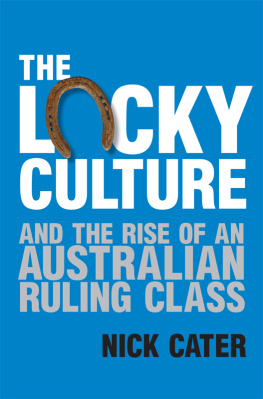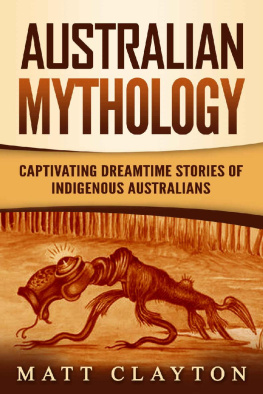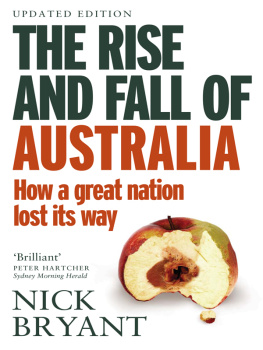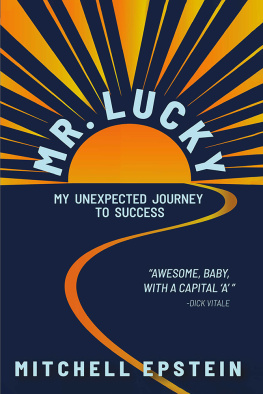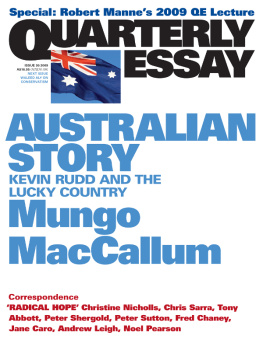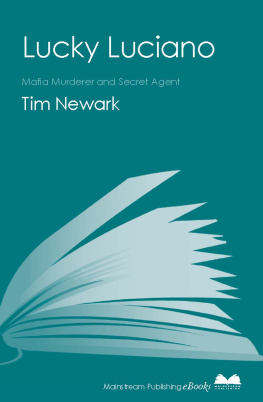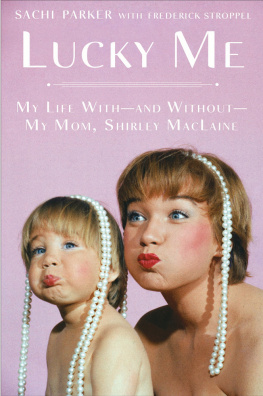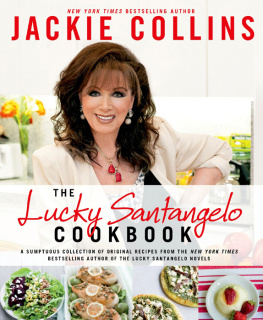Nick Cater is a journalist and has been a senior editor at The Australian since 2004. He began his career at the BBC in London and has worked for News Limited in Adelaide, Canberra and Sydney, and as a foreign correspondent in Asia.
HarperCollins Publishers
First published in Australia in 2013
This edition published in 2013
by HarperCollins Publishers Australia Pty Limited
ABN 36 009 913 517
harpercollins.com.au
Copyright Nick Cater 2013
The right of Nick Cater to be identified as the author of this work has been asserted by him under the Copyright Amendment (Moral Rights) Act 2000 .
This work is copyright. Apart from any use as permitted under the Copyright Act 1968 , no part may be reproduced, copied, scanned, stored in a retrieval system, recorded, or transmitted, in any form or by any means, without the prior written permission of the publisher.
HarperCollins Publishers
Level 13, 201 Elizabeth Street, Sydney NSW 2000, Australia
31 View Road, Glenfield, Auckland 0627, New Zealand
A 53, Sector 57, Noida, UP, India
7785 Fulham Palace Road, London W6 8JB, United Kingdom
2 Bloor Street East, 20th floor, Toronto, Ontario M4W 1A8, Canada
10 East 53rd Street, New York NY 10022, USA
National Library of Australia Cataloguing-in-Publication data:
Cater, Nick, author.
The lucky culture / Nick Cater.
ISBN: 978 0 7322 9629 2 (pbk.)
ISBN: 978 1 7430 9813 4 (epub)
Includes bibliographical references and index.
Australians Social life and customs.
Australians Social conditions.
Culture.
Australia Social life and customs.
Australia Social conditions.
Cover design by Hugh Ford Design
Cover image by shutterstock.com
Author illustration by Bill Leak
An open go
The only keys in my pocket were the ones that unlocked our suitcases. The house and car had been sold, the furniture dispatched and here we were at Sydney airport with spent one-way tickets as souvenirs. At the age of 31, I was unemployed and homeless in a country I had bought off the plan, feeling exhilarated and terrified in equal measure.
You dont have to be Protestant to possess the work ethic in Australia, you just have to be an immigrant, for no one starting a new life can afford the luxury of failure. The first duty of migrants is to justify their fateful decision to family, friends and, most importantly, themselves. They must prove that this is a better place, even if they have to make it so themselves. They will be given every opportunity, since Australian playing fields are level, and old and new Australians are accorded equal respect.
For those who grew up in the British class system, something particularly refreshing hangs in the egalitarian breeze as soon as you step off the plane. Customs and immigration officers command respect, not because they are wearing uniforms, but because they are earning an honest living, just like the taxidriver you sit next to, not behind. There is no recourse to status, and therein lies the promise, repeated so often that it ought to be a clich: in this country everybody gets a fair go . There are no institutional barriers to success; the only restraints are personal deficits of imagination, energy and courage.
Within a fortnight I found myself in Adelaide with an introduction from a mutual friend to the Advertiser s then editor, Piers Akerman. The conversation started badly; Piers appeared impatient with an applicant who had never worked on a newspaper, couldnt write shorthand and whose nearest journalistic contact was 18,000 kilometres away. He looked at me suspiciously, head tilted forwards, eyebrows lowered, an expression I was to become familiar with over the years. I suspect that that would have been the end of it had he not asked about the kids. Anna had missed out on her first birthday because her feckless father had booked a flight, on that day of all days, across the Pacific dateline. Robert, aged three, had been sick all night, and was asking when we were going home. Beneath Pierss austere expression, I could sense a heart was beating. You can start on Monday, he said, and well see how you go. After the bureaucracy of the BBC and the pomposity of everyday British life, it was a refreshing introduction to the Australian workplace. It was clear, however, that a start in the Australia vernacular was different from a job , and what happened next, for better or worse, was entirely up to me.
I grew up in Hythe, an enclave of the working and lower middle classes situated on the muddy fringes of Southampton Water, halfway between the oil refinery and the docks. The local comprehensive school was consistently mediocre, a place where pupils aspired to be fair to middling, for the smart and the dumb were treated with equal disdain. It was not until I arrived at Exeter University that for the first time I came across people who had been to a private school; they pronounced all their syllables, exaggerated their vowels and had rather hoped to go to Oxford with their chums. We called them wellies, because they dressed like gentleman and lady farmers in Wellington boots and Barbour jackets. We mocked their accents and pretensions, they mocked ours, and when Margaret Thatcher came to power in 1979, it seemed to be all their fault. It was some years before I discovered that the people who put Maggie in power, not just once but three times, were the people I had grown up with: the socially conservative working and lower middle classes.
I spent a gap year as a volunteer community worker in the West Midlands, trying to repair failed social experiments. In the evenings we ran a shelter for the homeless and by day we would lend assistance to the rehomed , the people who had been moved from the slums to welfare-churning concrete council estates half an hour by bus from the city centre. The estates had been built from large prefabricated concrete slabs, slotted together around a metal frame and held together by gravity, a technique known as plattenbau in East Germany, the only other place it took off. These days we would call our clients victims , and in a sense they were; the homeless were afflicted by alcoholism and mental illness while the homed suffered from leaking windows and hubristic central planning. The errors of the postwar progressive project were catalogued each week on the pages of New Society , a magazine I had subscribed to since the age of fourteen. At the time, we blamed simple errors of design, expecting social engineers to fix socially engineered mistakes. It took years for me to come to the reluctant conclusion that the entire edifice of the welfare state, in which we had invested our hopes for a better Britain, was a monumental, multi-storey mistake.
A dispiriting year with the Brummies, followed by an undergraduate course in sociology, proved the perfect cure for youthful idealism. The downside was that I was, to all intents and purposes, unemployable; though I was not without ambition, and I began applying for traineeships at the BBC. Undaunted by the selection panels blindness to my journalistic potential, I drove laundry vans for a year while the corporations glacial personnel department considered if I were capable of being trained to run a radio studio. By this circuitous route, I began my professional broadcasting career turning a Bakelite knob on a prewar control panel in Bush House at 2.00 am, trying to lower my voice an octave as I made my first station announcement: This is the External Service of the BBC. The following program is in Mandarin Chinese.

